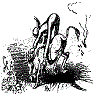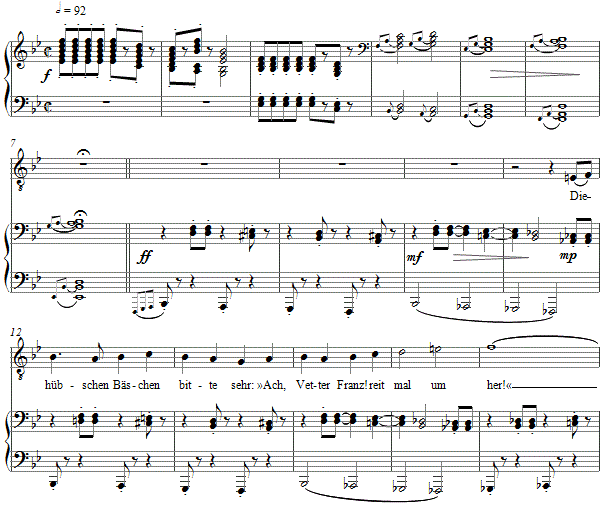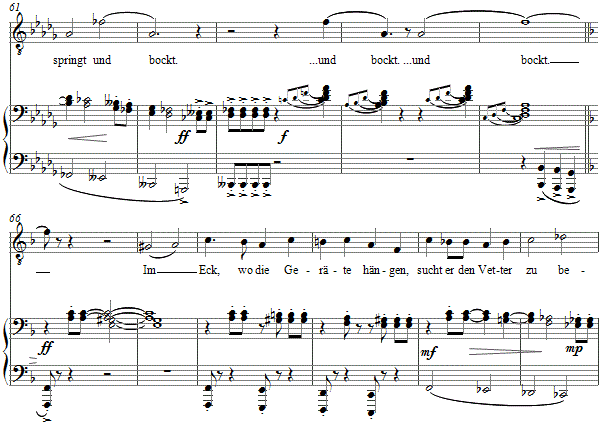Music and Texts of GARY BACHLUND
Vocal Music | Piano | Organ | Chamber Music | Orchestral | Articles and Commentary | Poems and Stories | Miscellany | FAQs
Vetter Franz auf dem Esel - (2011)
Wilhelm Busch
for tenor and piano
Die hübschen Bäschen bitten sehr:
»Ach, Vetter Franz! reit mal umher!«
Und Franz, natürlich gleich bereit,
Gewinnt das Tier durch Freundlichkeit.
Schon sitzt er drauf und kommt nicht weiter,
Worob die Basen äußerst heiter,
Er denkt: »Ja, wart! du wirst schon gehn!
Ich muß dich mal beim Schwanze drehn!«
Jetzt brennt er ihm am Kreuz herum;
Den Esel ziehn die Schmerzen krumm.
Und er, der eben noch verstockt,
Ermuntert sich und springt und bockt.
Im Eck, wo die Geräte hängen,
Sucht er den Vetter zu bedrängen.
Nun druckt er gar nach hint' hinaus
Ins glasbedeckte Blumenhaus.
Da steht die bittre Aloë,
Setzt man sich drauf, so tut es weh
Die treibt durch ihre Dorne
Den Esel schnell nach vorne.
Und! - schwupp - kommt Vetter Franz im Bogen
Auf die Cousinen zugeflogen.
Und! - plautz perdautz! - geht's über Kopf
Durch Butter und durch Millichtopf.
Am Schluß bemüht ein jeder sich
Hinwegzutun, was hinderlich.[ 6 pages, circa 3' 00" ]
Vetter Franz auf dem Esel
The text is found in Busch's Münchener Bilderbogen (1868), each couplet describing a drawing in the series by this amusing poet. I would extend this tale and its metaphor of "I can" wholly disconnected from "I shouldn't" to such other human disciplines as politics and economics on a national scale and private behaviors on a personal level, for indeed what begins innocently enough often turns quickly into the unintended consequences of man's hubris coupled to his firm conviction that no such consequences will be met.
Cousin Francis' Donkey Ride
His comely cousin's pleas increased:
"Come, cousin Francis, ride that beast!"
Brave Francis decided without duress
To win over an ass with friendliness.
Quickly he mounted, his aim to ride;
To his cousin's cheers, he sat astride.
He thought: "But a giddyap won't make him go;
Perhaps twisting his tail? Yup! Tallyho!"
For the sting to that donkey's derriere,
The ass tossed a clinging Francis into the air.
Its stubbornness melted fast away,
As it bucked and brayed its ass' neigh!
Against a shed, garden tools were hung;
Both rider and ridden together sprung.
Directly the hothouse loomed ahead,
And towards - then through - it they sped.
Broken window glass and thorny plants
Sliced through Francis' shredding pants.
All happened with such frightful speed
There was little chance to intercede.
Rider and ridden bucked, then broke
Towards the comely cousin, as a donkey's joke.
And - crash, boom, bang - Francis was dropped;
Midst the picnic spread the chap was plopped.
That short, mad ride ended in such a mess,
As the bloodied cousins had to confess.
rhymed paraphrase by the composer
Copyright 2011 © Gary Bachlund
The setting begins with exuberant five-note chords in a bright major, with a "vamp" style leading to the vocal part. Major alternates with darker whole tone coloration and staccati to long arches of sustained notes. The images are musically illustrated, moving through a variety of keys and textures, with the bray of the donkey marked a piacere, such that the pianist might take license with these gestures in tempo as articulation.
The episodic nature of the drawings and the couplets which accompany them in Busch's masterful hand are followed as a map. As the situation changes, so do tonal regions. The song setting ends with the inclusion for the singer of a final donkey's bray to remind that the hero and title character of our story was indeed an ass.
For other song settings for texts of Wilhelm Busch, click here.
The score is available as a free PDF download, though any major commercial performance or recording of the work is prohibited without prior arrangement with the composer. Click on the graphic below for this piano-vocal score.


